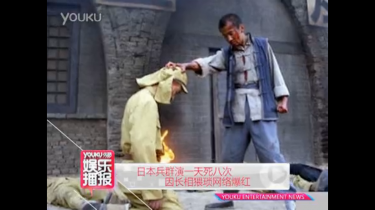The Chinese entertainment industry's relentless production of films about Japan's World War II-era invasion of China has come under the spotlight after TV extra Shi Zhongpeng made headlines in China last week for reportedly having acted as a Japanese soldier [zh] more than 200 times last year and even having “died” eight times in a single day for different projects.
With China and Japan currently sparring over islands in the East China Sea, the Japanese invasion of Manchuria in 1931 has become a safe and popular choice for movie directors who continuously face strict censorship. For example, in Hengdian film studio in China's eastern Zhejiang province, about 48 movies dealing with the Japan's invasion of China were shot in 2012.
“There's a limit on historical dramas and spy stories allowed to be aired during prime time slots,” Zhou Weicheng, general manager of Greentown Media told Chengdu Business News [zh]. “What can we shoot other than the Japanese invasion?”
For these reasons, Chinese TV channels have been inundated with anti-Japanese movies aimed to educate, euphemistically speaking, the Chinese audience. Chinese media and netizens have questioned the intention of authorities and expressed concern over movie censorship.
Commentator Yu Deqing further explained [zh]: “The Chinese movie industry has two aspects: on one hand, some sensitive topics are strictly censored; on the other hand, some mainstream topics will get government funds, such as those about the Japanese invasion. Movies with breakthrough ideas that require advanced technology are difficult to get past censors or get government funding.”

A screenshot of a report on video hosting website Youku about TV extra Shi Zhongpeng who acted as a Japanese soldier over 200 times last year.
Education or brainwashing?
One user on Chinese micro-blogging website Wangyi Weibo questioned [zh] the need to produce so many dramas:
日军侵华虽然值得我们每一个中国人铭记,但我们是不是真的有必要拍出N*N部出来,并变着法的来丑化日本?让本来是只该对日本法西斯的憎恶,升华成对整个日本民族的憎恶。
Although the Japanese invasion of China is worthy of our memory, is it really necessary to shoot and air so many movies, and try to find so many different ways to demonize Japan? It would only elevate our hatred of Japanese fascists to the hatred of the whole nation.
User leiyang516789991 questioned [zh] the authenticity of the movies on Wangyi Weibo:
别人的电影都是反射战争的残酷性和非人性,让观众对战争有理性的反思。我们的电影反映的是杀戮的正义性和领导人的英明伟大,让观众对那段真实的历史从始至终都稀里糊涂。没办法,历史这个小姑娘我们就是要打扮成这样的,尔等胆敢乱讲真话,拉出去枪 毙!
In other countires, war movies are a reflection of the brutality and dehumanization of war, which forces audiences to reflect. Our movies reflect the justice of killing and the greatness of the leaders, which make the audience confused about the real history. But what can we do? They dress up this little girl we like to call history any way they want to, whoever dares to speak the truth will be pulled out and shot!
User wangwei1976 echoed [zh] the sentiment on Wangyi Weibo:
抗日片不真实让我们觉得抗战是场游戏,这会误导我们的人民。这是对历史的背叛,强调历史的真实能让我们更清楚的去面对明天!日本拍得日美之间的战争和德国拍得德苏之间的战争,美国人近几年拍得二战大片中,都真实得让人对战争和人性进行深层次的思考。这才是一个民族自信的源泉!
The untruthful portrayal of the Japanese invasion makes me feel as if it's just a game, which can be misleading. This is a betrayal of history. Understanding the true history allows us to face the future with a clear head! Japan's movies about the war between Japan and the United States, Germany's movies about the German-Soviet war and American movies about World War II have inspired people's deep reflection on war and humanity. This is the source of a nation's self-confidence!
The consequences of movie censorship
Economist 李子暘 commented [zh] on Weibo about the general situation of movie censorship in China:
抗日剧泛滥是管制的闹剧。投资影视,不是闹着玩的。万一题材通不过,百万千万甚至上亿的投资就要打水漂。谁也受不了。因此,就只好跟 风,题材政治安全是首要考虑的条件。既然抗日题材政府允许,那就赶紧拍。在中国做影视,创新是最可怕最疯狂的,跟风无可指责。
The overflow of movies about the Japanese invasion is the result of censorship. Investing in movies is not a joke. If the topic doesn't pass the censors, millions and even billions of investment will be in vain. No one can afford to go through this. Therefore, people have no choice but to follow suit. Political safety is a priority when choosing a topic. Since the government gives the OK to anti-Japanese themes, then why not shoot them. In China, film innovation is the most scary and crazy thing a person can do. One can't be blamed for following the trend.
Commenter 于德清 expressed [zh] his concern over the censorship on Chengdu Business News:
问题是,过度的行政管制,只会抑制创新和产业的升级。造成抗日剧的低水平和无聊重复的原因,大抵如此。其一个直接后果是,电视的吸引力下降,人们远离沙 发。近年来,大中城市电视开机率已经明显下降。年轻人都上网看美剧、韩剧了。可是,有些管制者仍然不明白,他们把市场管死了,自己还有什么用呢?
The problem is that excessive administrative controls will suppress innovation and industrial upgrading, thus you have low level productions and copycats making anti-Japanese dramas. The direct consequence is a decline in the attraction of television; people will stay away from the sofa. In recent years, in big and medium-sized cities, TV watching rates have decreased significantly. Young people on to the Internet to watch American and Korean TV dramas. However, some regulators still do not understand that they have pushed their market into a dead end. What is the benefit for themselves?







5 comments
https://www.youtube.com/watch?feature=player_embedded&v=Eob4mxRhSeQ
http://www.sdh-fact.com/